Best Rooftop Cargo Carriers of 2024, According to Experts
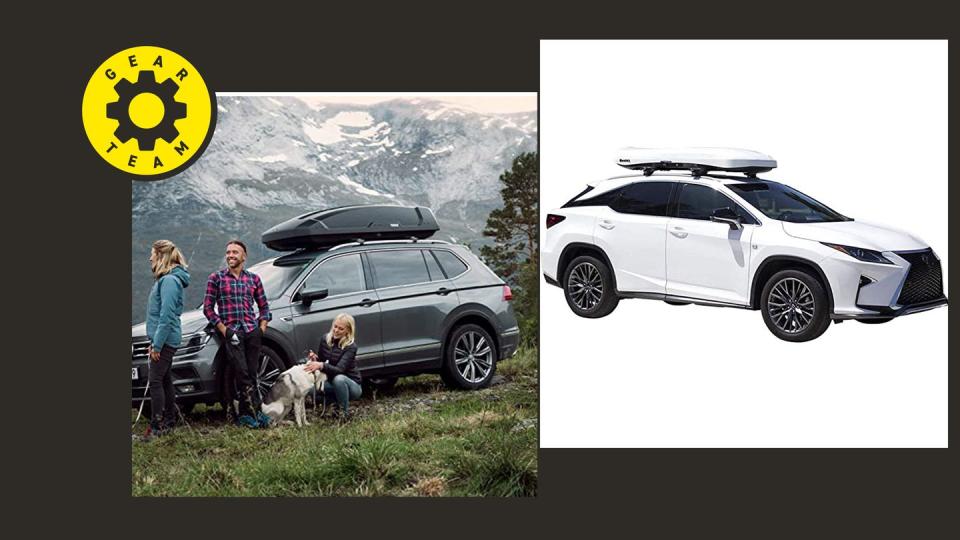
"Hearst Magazines and Yahoo may earn commission or revenue on some items through these links."
With everything from luggage and toys to pillows and blankets packed into the cabin, the annual family vacation or summer road trip can often feel cramped and stuffy. And the driver's sightlines? Forget about it. As a result, the popularity of rooftop cargo carriers has exploded in recent years.
Which one is right for you? We fully intend to test these devices ourselves in the future; in the meantime, we turned to the experts at the Good Housekeeping Institute to see what their latest test of rooftop cargo carriers discovered.
Our Top Picks
Today's hatchbacks, compact SUVs, and cars are sleeker, lighter, and more fuel-efficient than the vehicles of yore. But all that efficiency comes at the expense of something else. Unless you drive a full-size SUV, van, or pickup truck, modern cars are generous with comfort but can be stingy on things like headroom, back-seat legroom, and interior cargo space. The ability to stow your luggage and/or gear in a weatherproof, aerodynamic rooftop pod frees up cabin space for the passengers inside.
Cargo carriers are getting better and more popular every year, but too many are difficult or unwieldy to mount, add too much weight or drag to the vehicle, or are impossible to access with convenience. So until we can perform our own evaluations of rooftop cargo carriers, we turned to the people we know and trust: the Good Housekeeping Institute.
How GHI Tested Rooftop Cargo Carriers
The Good Housekeeping Institute has been evaluating consumer products for over 100 years, and while the methods and measurements have changed over the years, GHI's dedication to getting it right is as strong as ever. For this test, the Institute evaluated a slew of rooftop pods, carriers, bags, and racks on the market to find the best versions of each type. First, they checked each product's dimensions and versatility to pinpoint luggage carriers for every need—family road-trippers, skiers, car campers, pack rats, etc. Then, they mounted them on their cars and used the heck out of them.
Led by Good Housekeeping's Chief Technologist & Executive Technical Director Rachel Rothman, GHI editors and testers put a host of various cargo carriers, racks, and bags through the paces of everyday life and travel using different types of vehicles. The Institute evaluated four main benchmarks to measure each carrier's performance in real-world applications:
-Usability
-Ease of installation
-Storage capacity
-Convenience
After weeks of swapping carriers, comparing data, and researching the field, the Institute whittled its list of the best rooftop cargo carriers down to these top six—one for almost every driver and vehicle on the road today.
Someday soon, we at the Hearst Autos Gear Team intend to perform a test of our own on rooftop cargo carriers; stay tuned for that. In the meantime, here's what testers, scientists, and editors at the Good Housekeeping Institute discovered when they set out to determine the Best Rooftop Cargo Carriers.
Yakima Skybox 16
Good Housekeeping chose the 16-cubic-foot Skybox as its Best Overall Rooftop Cargo Carrier because it ticked all the boxes in terms of durability, effectiveness, and ease of use. Its sleek and relatively hot design didn't hurt either. GHI loved the tapered rear of the box, which allows room for hatchbacks to tilt up without difficulty, and the dual-sided opening that makes the Skybox convenient to access from all around the car.
The lockable lid keeps your stuff secure, and the versatile mounting system should fit most roof racks. Best of all, it comes in three sizes to fit almost any vehicle and gear.
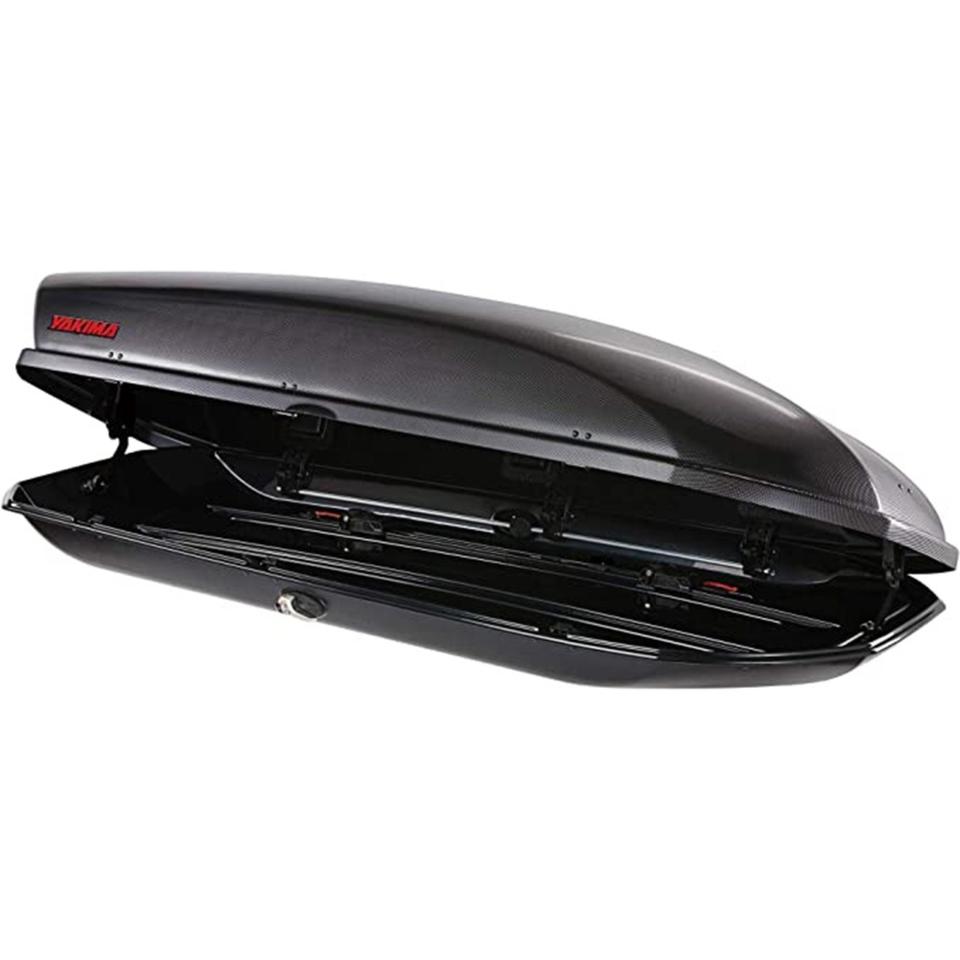
Yakima Skybox 16
amazon.com
$529.00
YakimaJEGS Rooftop Cargo Carrier
If you're looking for an affordable rooftop pod without sacrificing functionality, you could do worse than the JEGS. It's one of the largest-capacity cargo carriers on this list and features much of the functionality of pricier options, such as dual-sided access and a watertight design. Its boxy design isn't suited for long items such as skis and golf clubs, but it's ideal for luggage.
GHI engineers noted its lightweight construction may not hold up as well as some others. Further, the U-bolt mounting system requires your crossbars to be exactly 24 inches apart, which may require an additional aftermarket crossbar (or some clever jury-rigging on your part).
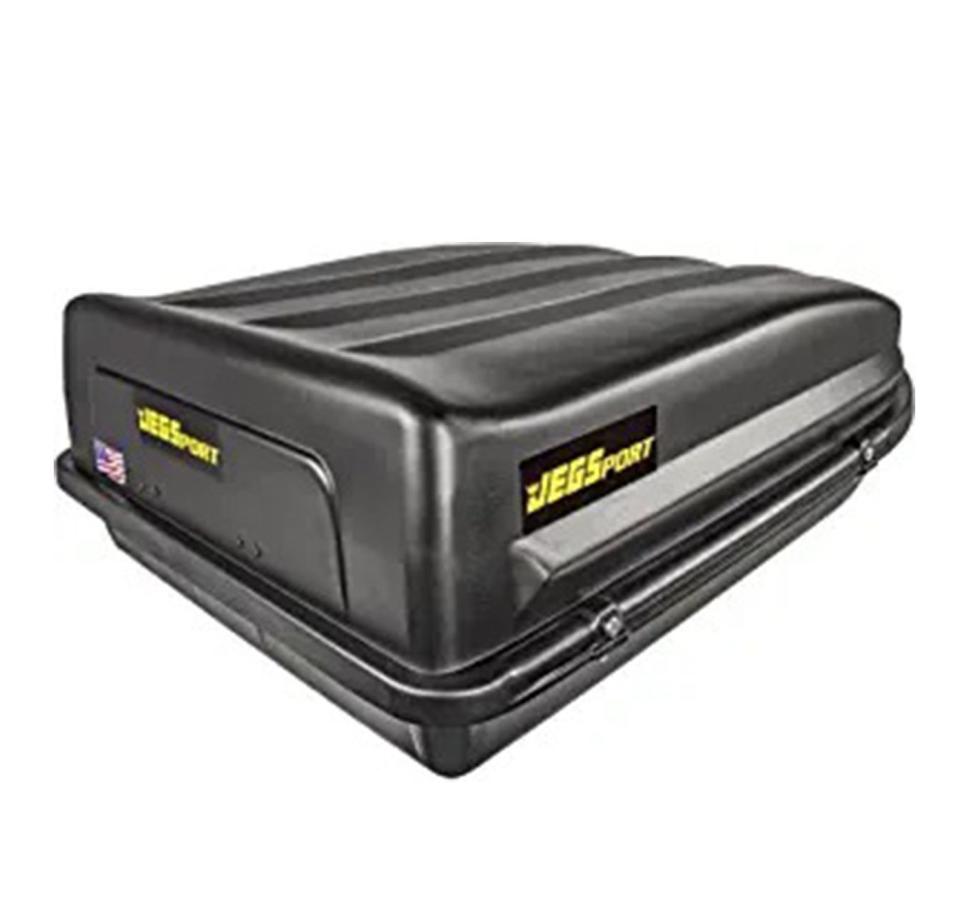
JEGS Rooftop Cargo Carrier
amazon.com
$299.99
AmazonThule Force XT XL
One of the most trusted brands in rooftop storage, Thule's extra-large cargo carrier is also aerodynamic and easy to use. GHI testers were able to load seven pairs of skis into the Force XT XL and, even at high speeds with a full load, wind noise and drag were minimal.
GHI testers were impressed by the usability of Thule's quick-mount system with its intuitive "PowerClick" design that makes an audible clicking sound when the carrier is properly secured. Rothman noted that she needed to add wingbars to her Volvo XC90 in order to mount the Thule but said the process was easy after that.
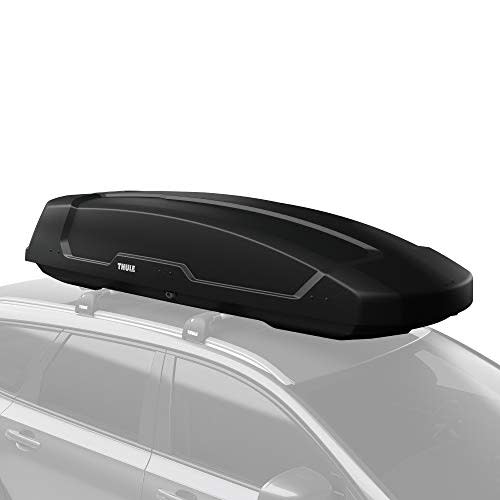
Thule Force XT XL
amazon.com
$799.95
AmazonInno Wedge
Looking to transport skis, snowboards, or other long and thin items? This is the rooftop cargo carrier for you. It rises just 9.6 inches above the roof rack, limiting cargo space to 11 cubic feet (enough for six to eight skis or four snowboards) but making it ideal for parking in a short garage.
The Wedge has a great design, but we wish it came in colors other than white. It's also the priciest cargo box on this list, although not by much.
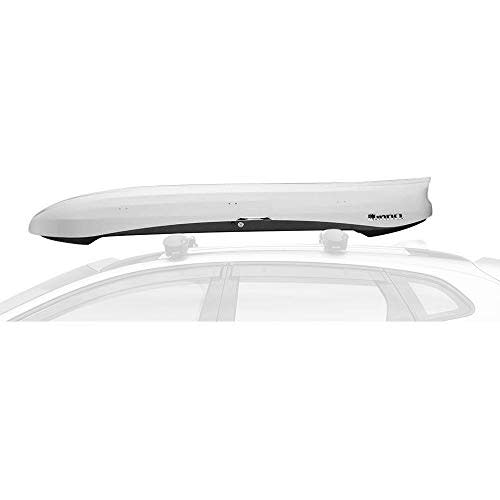
Inno Wedge
amazon.com
$853.79
InnoRoofBag
If you're not sold on a hard-shell cargo box, the RoofBag offers an affordable, versatile—and temporary—solution. Available in four sizes from 13 to 34 cubic feet, this U.S.-made cargo bag is waterproof and tear-resistant, with triple heat-sealed seams (no stitching) and a 3-inch flap to protect the zipper.
It's simple to install on any large car or SUV, with or without roof racks. And it costs hundreds less than the other cargo pods on this list.
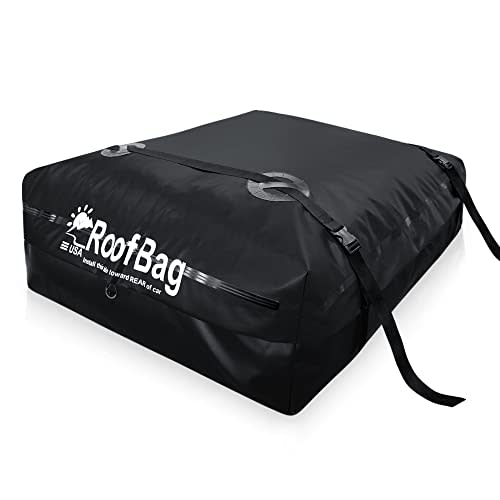
RoofBag
amazon.com
$99.99
RoofBagArksen Universal Roof Rack
If a covered cargo pod isn't your thing and you just want a cargo carrier to strap your gear to, this Arksen rack is made of alloy steel and offers plenty of tie-down points. It's just six inches high for a low-profile solution that won't break the bank, and it mounts to any vehicle with roof-rack crossbars using four U-bolts. GHI engineers say the angled front panel should increase aerodynamics and cut down on wind noise.
At 43 by 39 inches, this is the smallest of six Arksen Univeral roof racks, with sizes up to 84 by 50 inches.
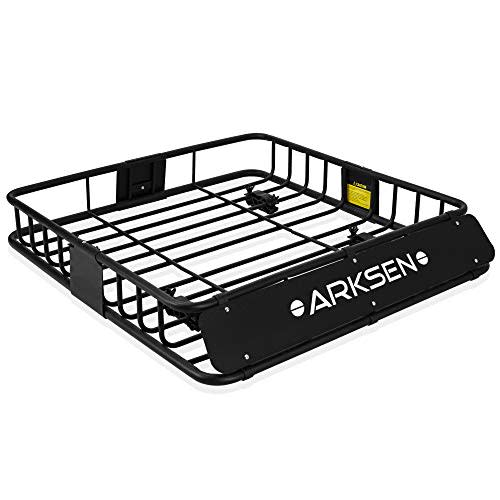
Arksen Universal Roof Rack
amazon.com
$119.96
ArksenHow Good Housekeeping Picked the Best Rooftop Cargo Carriers
With so many options out there, how did Good Housekeeping choose the six that made this list of the best rooftop cargo carriers? The answer is simple: research.
Analysts first surveyed the market, relying on user reviews, brand recognition, top sellers, and more to pare down their selection to a manageable number. The product experts at the Good Housekeeping Institute leaned into their expertise in the automotive space to identify brands, types, and styles of rooftop cargo carriers that have proved the most reliable through years of auto-related product testing. They also looked at newer brands with interesting features and innovations.
Based on a review of technical data including dimensions, claimed capacity, and installation methods, the team selected various models to put through rigorous hands-on testing, allowing for real-world evaluation involving actual vehicles. Testers assessed the ease of installation, determining how long the carriers took to mount and how intuitive the process was. They also measured actual storage capacity; product experts always know to be skeptical of manufacturer claims. Next, testers assessed overall usability: how easy the pods were to open and close, any included accessories, and the ease and efficacy of locking mechanisms. Finally, Institute experts assessed each cargo carrier's durability, noting the quality of materials and construction as well as how weatherproof each carrier is likely to remain over time.
What to Look For in a Rooftop Cargo Carrier
To find the ideal rooftop cargo carrier for your needs, consider the following:
Types
Box: Hard-shelled pods provide the most secure storage for cargo. They typically come pre-assembled, so you'll just need to attach them to your vehicle with clamps, U-bolts, or other mounting hardware. Box carriers usually include a locking latch. The downside to this type of pod is they tend to be expensive and their boxy shape causes wind drag that can be noisy and impact your vehicle's fuel efficiency.
Bag: Soft-sided bags attach directly to the roof of your car with straps, eliminating the need for a roof rack and making them much easier to install and remove. Bag carriers are more affordable too, often selling for $100 or less. Most claim to be weatherproof, but they don't provide the same security and protection as hard-sided pods.
Basket: These big metal baskets mount to the roof rack, providing a stable storage area for bulky items that you then secure with straps, bungee cords, or rope. They're affordable, easy to use, and, when empty, don't create a lot of wind drag. But objects stored in a basket are exposed to the weather and are easy pickings for thieves.
Specs
Dimensions: Check the length of the cargo carrier relative to your vehicle. If it extends out past your windshield it could block your view or, more likely, increase wind drag exponentially, resulting in noise and reduced mileage. If it extends past the back of your roof, it may prevent your hatch from fully opening. Also consider its height. A low-profile model, 11 inches or less, might be better than the more typical 15 to 18 inches—especially if you plan to park in a garage.
Shape and Storage Capacity: If you plan to tote longer gear, like skis and golf clubs, you'll need a longer cargo carrier. For luggage, you'll want a cargo carrier with enough height to fit suitcases. Carriers generally range from around 8 to about 22 cubic feet, so for an average load you want to be somewhere in the middle.
Weight: Consider the weight of the carrier, since this will impact the ease of installation. Lightweight models weigh as little as 15 pounds, while the heaviest come in at more than 60 pounds. Next, check the weight capacity of the carrier to make sure it will support your gear. Finally, consider your car's dynamic load limit, found in your owner's manual. While some carriers can support as much as 175 pounds of gear, your car's roof may not be able to hold that much weight.
Features
Mounting hardware. Make sure the carrier you're considering is compatible with your roof rack. In some cases, additional mounting systems or brackets may be required.
Lock. This is especially important if you plan to haul expensive gear. GHI experts stressed that all the carrier locks they tested were rated as theft-deterrent, not theft-proof. Buyer beware.
Open/close mechanism. The access on box carriers can be one-sided, dual-sided, or rear. Dual-sided is the most versatile, allowing access from either side of the vehicle. One-sided or rear access is the norm on budget carriers. Most cargo bags will feature a zipper that opens to three sides. For better water repellency, look for a bag with a rain flap that covers a sturdy zipper.
Interior storage. The least expensive carriers tend to be empty shells. As you go up in price, you'll start to see more useful storage features. Integrated internal tie-down points are helpful for securing loads, while felt liners prevent scratches. Some high-end cargo boxes feature built-in LED lights.
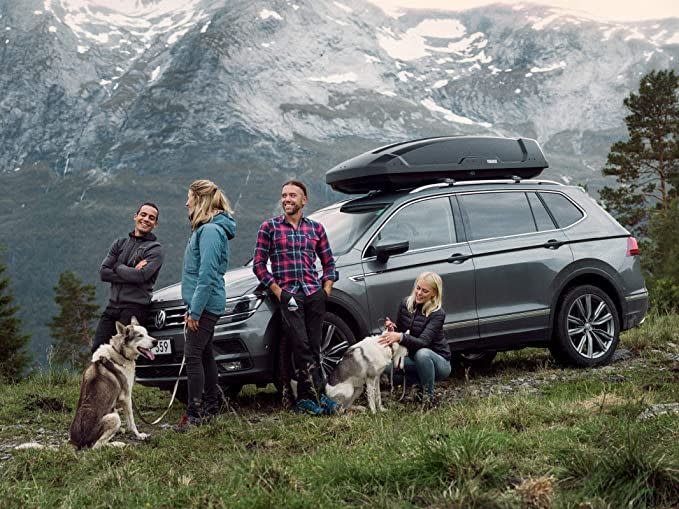
Are Rooftop Cargo Carriers Safe?
Absolutely—provided they're installed correctly and used appropriately. Here are three keys:
Size it correctly. A pod should be just big enough to carry your gear, but not so massive that it adds wind or weight drag to the vehicle. Also, make sure the carrier's load capacity doesn't exceed that of your car.
Install it securely. Loose bolts, unsecured straps, and over-torqued clamps can all create hazards on the open road. Always follow the manufacturer's instructions to the letter, and check to see if your OEM offers cargo carrier guidance; many car models have certain limitations or installation methods they recommend.
Load it evenly. Even weight distribution of gear is crucial. Experts recommend tying down stowed items to keep your gear from sliding around inside the pod.
Why Trust Good Housekeeping?
The Good Housekeeping Institute Home Improvement & Outdoor Lab provides expert reviews and advice on all things home and autos related, including rooftop carriers. In his role as Director of the Home Improvement & Outdoor Lab, Dan DiClerico brings more than 20 years of experience to the Institute, having reviewed thousands of products for Good Housekeeping, as well as brands like Consumer Reports and This Old House.
For this report, Dan worked closely with Rachel Rothman, Chief Technologist & Director of Engineering at the Institute. For more than 15 years, Rachel has put her training in mechanical engineering and applied mathematics to work by researching, testing, and writing about products across the home improvement and autos space.
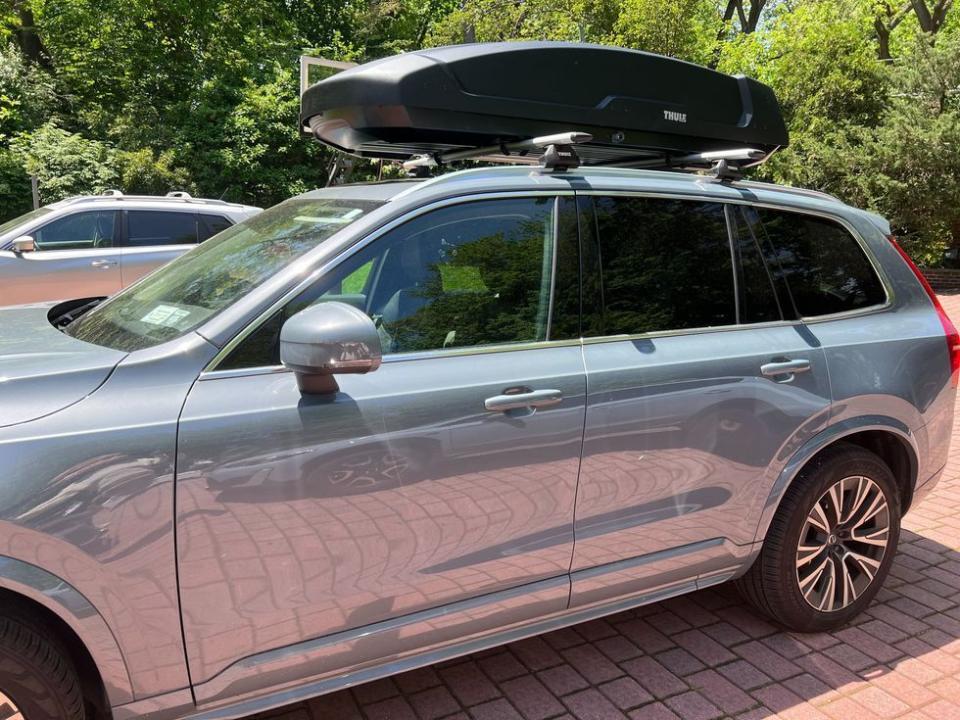
Why Trust Us?
Car and Driver and its sibling publications at Hearst Autos represent three of the most influential automotive publications in the world. We rely on decades of experience in the automotive and gear spaces to help readers make informed purchasing choices. Read more about our testing process here.
With the legacies of Autoweek, Car and Driver, and Road & Track behind us, the Hearst Autos Gear Team is more concerned with the trust our readers have in us than our bottom line. We won't tell you to buy something if we wouldn't buy it ourselves or recommend it to our friends, and we'll never claim to have used or tested something if we haven't. Our picks and recommendations of products and gear are based on testing and knowledge, not hype.
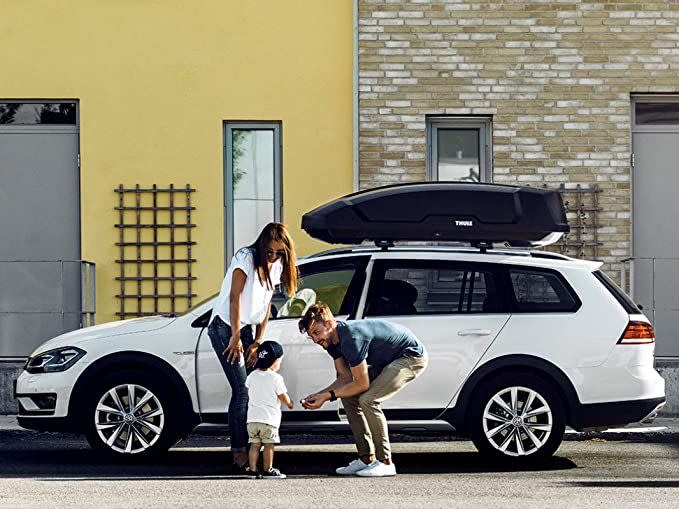

 Yahoo Autos
Yahoo Autos 